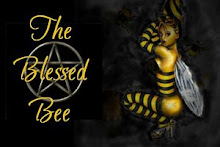Apple
Apples have apparently been regarded as sacred or magical in almost every country in which they grow, and from very early times. In ancient Ireland the apple-tree was one of three things which could only be paid for by living objects. To destroy an orchard was in many parts of England almost sacreligious, and it was said that if an orchard was destroyed to make way for another crop, the crop would never prosper. In Yorkshire it was considered unlucky to strip an apple-tree completely, and an apple or two (even deformed or inedible fruit would do) was always left as a gift for the birds (or faeries).
An old Samhain charm was for all the district's unmarried young people to tie an apple onto a piece of string and whirl it around before a fire. The one whose apple fell off first was said to be the first to marry; the last left with an apple was fated to die unmarried. An apple could also be peeled in one long strip and tossed backwards over the left shoulder, and the shape made by the peel was said to show the initial of the future spouse.
An old cure for warts was to cut the apple into as many pieces as there were warts, rub each piece on a wart and then bury the pieces in the earth. A variant of this stated that the apple should be cut in half and each half rubbed on each wart, after which the apple should be tied together and buried.As the fruit rotted, the warts would disappear.
The ancient custom of Wassailing the apple trees was intended to awaken the sleeping tree-spirit, drive away bad luck, and ensure a good harvest. It usually took place around Yule, and involved the farming folk choosing one tree in the orchard to represent all. The people would drink to the tree with cider, throw cider over its roots and put a piece of bread or toast soaked incider into a fork of the tree's branches. Guns were fired through tht top most branches of the trees and much noise was made by blowing cow-horns and beating on pots and pans. Often the trees were danced around, and in most places some variant of the Wassailing Song was sung. Omitting the ritual was thought to bring bad luck and a poor yield of apples that year.
Bread
The making of bread is laden with ancient beliefs and portents. Not only has bread been sacred as the representation of the entire harvest, but it has always had a deep religious significance for Christians because of its associations with communion. At one time it was universally considered to be bad luck to throw away bread, and it was said that whoever did so would live to know hunger.
In some parts of Scotland, it was considered ill-omened to sing while baking bread, or to bake while a dead body lay in the house. Bread must be put into the oven by one person only, as if two people share the task they will quarrel. During the baking, no other bread must be cut or the fresh bread will be spoilt; bread that is required during baking should therefore be broken,not cut. If a loaf of bread comes apart in a girl's hand, she will not be married until the next year; in some places this portends a quarrel in her family. It is ill-omened to put a loaf of bread on the table upside down, to cut it at both ends, or to grab the bread while someone else is cutting it.
Charms and spells in which bread was used often involved healing. In the sixteenth century it was considered to cure toothache if a piece of whitebread marked with a cross was laid against the aching tooth. A piece of bread wrapped in cloth and buried for three days, then dug up and eaten, was supposed to cure whooping-cough in Suffolk.
It is unlucky for anyone to take the last piece of bread and butter from a plate without its being offered first; if an unmarried girl does this, it is said that she will never marry. However, if the last slice is offered it should always be taken, as this is said to guarantee good luck in love and money.
Butter
The making of butter is also surrounded by charms and omens; it was considered that fairies could overlook the dairy and enchant the cream from a distance to prevent it turning to butter and many charms were used to nullify their power. A churn made of rowan wood, or with rowan set about the handle, was considered to protect the cream; in England salt was thrown onto the fire beforehand to neutralise evil, and in Ireland a smouldering turf under the churn was held to purify the butter-making. A silver coin, or three hairs from a black cat's tail, thrown into the cream would also help; plunging a red-hot poker into the cream when the butter would not come was also considered to be effective,burning out the evil. A dairymaid would often murmur a special charm while churning the cream, such as:
Churn, butter, dash
Cow's gone to the marsh
Peter stands at the toll-gate
Begging butter for his cake,
Come, butter, come!
Nuts
Nuts are ancient symbols of fertility, and have therefore been used as fertility charms, intended to promote healthy childbirth, in wedding rituals in many cultures. In France they were once thrown at weddings as rice or confetti are today; in ancient Rome and in some parts of England they were offered to a bride and groom as they left the church after marrying. In Britain a good crop of nuts in a district is said to herald a large number of births there during the next year; an old country saying states 'Good nutting year, plenty of boy-babies'.
Nuts have often been used in charms and fortune-telling. One old love-divination was for a girl to take two hazelnuts, name one for herself and one for her lover, and set them both on the grate of the fire. If the nuts burned together their love would last, but if they failed to burn, or flew apart, her lover would not be true. A way to tell whether a wish would be granted was to toss a nut onto the fire; if it flared up and burned the wish would be granted.
A nut with two kernels in a single shell was always a lucky sign. An old charm to gain the love, friendship or favour of someone was to offer them one of the kernels of a double-kernelled nut; if they ate it and the giver ate the other at the same time, both in silence, the charm would succeed. The double-kernelled nut could also be wished on by eating one kernel and tossing the other over the left shoulder while wishing; this had to be done in silence,and silence must be kept until the wisher was asked a question to which he or she could answer 'yes'.
Onions
A raw onion carried in the hand is supposedly a preventative against snakes,who are commonly believed to dislike their smell. A peeled onion was supposed to attract germs, and therefore they were often left about in a house to prevent everything from plague to the common cold (although in the latter caseeating the onion would have been more effective!) Another cure involved peeling an onion in a house where a sick person lay, and then burying the onion far from the house; it was believed that the onion would draw germs and diseases into itself and then carry them from the house. Onions are still usedin poultices for chilblains; they were also used in cough syrups, and even as hangover remedies.
Peas
An old cure for warts involved taking a pod with nine peas in it, rub it on the warts and then throw it away, saying 'Wart, wart, dry away'. Another wart remedy was to touch each wart with a different pea on the first day of the new moon, wrap the peas in a cloth and throw it away backwards, or to wrap each pea separately in a piece of paper and bury it. As each pea decayed, the wart it had touched would disappear.
When shelling peas it is considered good luck to find a pod containing just a single pea, or a very large number of peas, and a pod with nine perfect peas in it is by far the luckiest pod.
Salt
Since it is incorruptible and also preserves other things from decay, salt is a symbol of immortality and eternal life, and also means the creating of bonds. To eat another person's salt was to forge a mythical bond between guest and host which was always binding; in Scotland the First Foot, who is the first person to enter a house in the New Year, usually carries salt with him. One of the first things carried into a new home was often a plate of salt,along with a piece of coal and loaf of bread; they represent prosperity and health, warmth and plenty. Salt was also amongst the first gifts given to a newborn baby, and was frequently carried in the pocket as a protective charm.
Spilling salt is a bad omen, and many people today will still throw a pinch of salt over their left shoulder if they spill it. An old saying states that a tear will fall for every grain spilt, and a salt-shaker that overturns between two friends means they will quarrel.
1.30.2009
Food Folklore
Posted by The Blessed Bee at 4:51:00 PM 0 comments
Labels: folklore, food, household tips, kitchen magic, kitchen witchery, magic, wicca, witchcraft
13 Kitchen Tips
13 Kitchen Tips
1. A quartz crystal placed on or near the stove when cooking makes food taste better.
2. A pot of basil herb grown in your kitchen keeps the area safe from evil forces and negative spirits.
3. Candles keep their shape better and longer when chilled thoroughly in the refrigerator.
4. A witch's kitchen should never be without a lunar calender or chart showing the phases of the moon and its movement through the wheel of the zodiac.
5. A full moon increases extrasensory perception and is the ideal time to prepare and use potions that increase the psychic abilities.
6. Love potions and aphrodisiacs should always be prepared during the waxing of the moon.
7. The best time to plant an herb or vegetable gardens when the moon is in Cancer, Scorpio, Libra or Pisces.
8. Homemade magickal incenses, sachets and potpourris become more fragrant if aged several months before used.
9. Homemade incense always should be stored in tightly capped or corked jars.
10. Unlucky influences should be kept away from the when cooking or preparing magickal recipes, and this is accomplished by stirring in a clockwise direction.
11. An aloe vera plant should be kept on the kitchen, as its juices are an instant cure for minor kitchen burns.
12. Herbal preparations should never be boiled in aluminum vessels, but in only copper, earthenware or pyrex to avoid contamination of the medicines.
13. Before casting spells or preparing potions, always keep in mind the Wiccan Rede: "Do what ye will an' harm none."
Posted by The Blessed Bee at 4:48:00 PM 0 comments
Labels: food, household tips, kitchen magic, kitchen tips, kitchen witchery, magic, wicca, witchcraft








